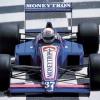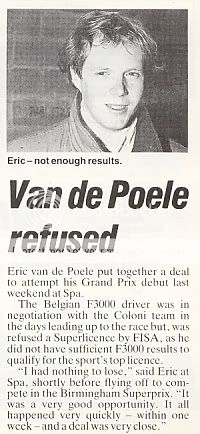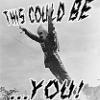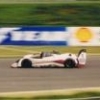
Drivers who were refused a FIA Super Licence and why?
#1

Posted 26 June 2007 - 20:50
What I wonder is how did the FIA decide to refuse someone a license? It seemed quite arbitrary.
Nowadays they have to complete a race distance in an F1 car but in the '80s and '90s apparently a driver had to achieve at least a 7th place overall in an F3 championship (like the British F3 champ.) or perform well in F3000. However looking at Thomas Kaiser's results he clearly should have got his license based on his performances and he was refused (he had signed for Brabham in 1987, Brabham opted for De Cesaris then).
An other interesting name that comes to my mind is that of Akihiko Nakaya. A Japanese driver that would have brought a lot of sponsor money to the Brabham team in 1992 and they needed the cash. Nakaya was refused since the FIA didn't consider F. Nippon as a competitive series. Yet Giovanna Amati wasn't exactly a fast driver with nice results, still she was accepted and received Nakaya's seat. Again it was Brabham that had a driver refused a Super License.
If U look at the '90s, why did slow drivers with no palmares like Taki Inoue and sportscar driver Giovanna Lavaggi got their Super License and a capable driver like Kaiser was refused in '87? Who decided the allocation of a Super License.
And is it correct the Swedish driver Thomas Danielsson also was refused a Super License based on medical reasons (he had sight problems with his eyes, I believe in '88 or '89. Danielsson was quite a good driver.
Who else was refused? (Fulvio Ballabio with the 1984 Spirit-Hart comes to mind).
#3

Posted 26 June 2007 - 21:14
But eventually, the issues was sorted out and he was allowed to drive for Andrea Moda soon afterwards.
#4

Posted 26 June 2007 - 21:36
Originally posted by Sharman
How did Ronnie Ducknum get a licence for GPs?
I suppose that U refer to Californian Ronnie Bucknum (with a 'B', not a 'D'), who raced for the Honda F1 team in 'the '60s.
Well to answer your question: I'm not sure when the Super License system was introduced but in the '50s and '60s there weren't such strict requirements to participate in F1. Especially in the '50s gentleman drivers with private backing and a private car were often seen on a grid.
On Ronnie Bucknum: he was a superb sportscar driver and dominated the American sportscar scene with 4 American club titles in the '60s. After his F1 carreer he went to Indycar (USAC) and performed quite well, in 1968 he even won an Indycar race at Michigan.
He certainly wasn't a bad driver and even achieved a 5th place in the Honda at the Mexican GP of 1965 although it should be mentioned that his teammate and compatriote Richie Ginther won that race.
Still it remains a mystery why Honda opted for a sportscar driver with little international experience and didn't choose a bigger name with single seater experience when they entered F1. Maybe it was due to their lack of autosport knowledge at the time.
#5

Posted 26 June 2007 - 22:03
#6

Posted 26 June 2007 - 22:14
#7

Posted 26 June 2007 - 22:17
Originally posted by F1Fanatic.co.uk
In 1992 a Japanese driver (I think) was refused a superlicence, which led to the comparatively less experienced Giovanna Amati making her F1 debut for Brabham. Can't remember the guy's name though.
Hi, U clearly didn't take the time to read the thread since I clearly mentioned him in the opening post:
"An other interesting name that comes to my mind is that of Akihiko Nakaya. A Japanese driver that would have brought a lot of sponsor money to the Brabham team in 1992 and they needed the cash. Nakaya was refused since the FIA didn't consider F. Nippon as a competitive series. Yet Giovanna Amati wasn't exactly a fast driver with nice results, still she was accepted and received Nakaya's seat. Again it was Brabham that had a driver refused a Super License."
#8

Posted 26 June 2007 - 22:20
Originally posted by Paul Rochdale
I have read that the reason Ronnie Bucknum was chosen was that if the Honda had been unsuccessful, Honda could blame the inexperienced driver. If it was successful, it was a really good car after all. I have no idea whether this theory was correct or not.
Hi Paul, this seems pretty bizarre reasoning from the Japanese team if it was true. After all, doesn't a new and ambitious team want a competitive driver who can deliver results? They must have seen a lot of potential in Bucknum if they hired him. After all: a bad driver can also hide the true potential of the car.
#9

Posted 26 June 2007 - 22:23
#10

Posted 26 June 2007 - 22:23
#11

Posted 26 June 2007 - 22:24
Originally posted by Paul Rochdale
I have read that the reason Ronnie Bucknum was chosen was that if the Honda had been unsuccessful, Honda could blame the inexperienced driver. If it was successful, it was a really good car after all. I have no idea whether this theory was correct or not.
Yes, I have read it somewhere as well
#12

Posted 03 September 2014 - 19:25
The drivers who do not get a super licence I have (perhaps someone has more examples):
Tiff Needell 1979 Ensign,
Ricardo Londoño-Bridge 1981Ensign
Fulvio Ballabio 1983 Spirit
Bap Romano 1985 Tyrrell
Michael Andretti 1986 Haas
Franco Scapini 1987 Coloni
Thomas Kaiser 1987 Brabham
Jari Nurminen 1988 Coloni
Marco Greco 1990 EuroBrun
Michael Andretti Benetton
Akihiko Nakaya 1992 Brabham
Oliver Gavin 1994 Pacific
Katsumi Yamamoto 1995 Pacific.
Paulo Carcasci 1995 Pacific
#13

Posted 03 September 2014 - 22:10
3rd time lucky for Andretti in 1993 then !!
#14

Posted 03 September 2014 - 23:08
Bap Romano would have been out of his league. Good in Oz sports cars, because he had the best car. But really was only an average punter.
#15

Posted 04 September 2014 - 00:00
The drivers who do not get a super licence I have (perhaps someone has more examples):
Oliver Gavin 1994 Pacific
Oliver Gavin superlicence problem was in 1995. He was announced as driving for Pacific at the end-of-season Australian GP, but the paperwork for his superlicence could not be sorted in time. He qualified for a superlicence as he had won the British F3 title one month earlier.
#16

Posted 04 September 2014 - 13:45
3rd time lucky for Andretti in 1993 then !!
Why on earth was he denied a superlicense in 86 and even more so in in 91 or 92 for Benetton? By 95 he was a regular podium finisher in CART and by 91 he was champion. How on earth can you give Senna and Brundle Superlicenses straight from F3, but not give a CART podium finisher one? That really smacks of European racing elitism. Heck, Andretti competed at LeMans in 83 and finished 3rd as well.
#17

Posted 04 September 2014 - 14:16
Yeah that really is weird. Being 'okay' in F3 or F3000 counts, but not if you have road and street racing experience in high powered cars with pitstop and full race-lengths, etc, et al.
#18

Posted 04 September 2014 - 16:04
If a superlicence ban kept Marco Greco out, it was all worth while. Made Maldonado look like Mother Teresa.
#19

Posted 04 September 2014 - 17:57
Why on earth was he denied a superlicense in 86 and even more so in in 91 or 92 for Benetton? By 95 he was a regular podium finisher in CART and by 91 he was champion. How on earth can you give Senna and Brundle Superlicenses straight from F3, but not give a CART podium finisher one?
Because CART was an outlaw series. Balestre basically vetoed any CART superstars coming over to F1. The exceptions were those who were effectively grandfathered in by qualifying before getting to CART. Michael Andretti was meant to be in a Haas Lolas as a one race deal - Eddie Cheever got the nod instead.
Advertisement
#20

Posted 05 September 2014 - 16:02
If memory serves, Alessandro Nannini was Minardi's first choice for their debut F1 season in 1985, his having been a regular part of their F2 team, but he was refused a Superlicence. They took Pierluigi Martini instead, and Nannini replaced him a year later. That one disappointing season all but killed off Martini's career but, after a couple of years' rebuilding his reputation in F3000, he became Minardi's star man.
#21

Posted 06 September 2014 - 16:19
How did Ronnie Ducknum get a licence for GPs?
Didn't need one. I had a licence to drive an F1 car, after all, I had done the necessary 6 clubbies and requisite National races to qualify for a full FIA racing licence, and that was in the 70s; it was only for safety, and when F1 became a franchise operation, that all the special qualification requirements came in.
#22

Posted 06 September 2014 - 16:34
Because CART was an outlaw series. Balestre basically vetoed any CART superstars coming over to F1. The exceptions were those who were effectively grandfathered in by qualifying before getting to CART. Michael Andretti was meant to be in a Haas Lolas as a one race deal - Eddie Cheever got the nod instead.
It's been said round here before but we are very lucky that there weren't internet forums when Balestre was in charge at FISA.
#23

Posted 17 September 2022 - 13:07
#24

Posted 17 September 2022 - 19:19
Edited by WonderWoman61, 17 September 2022 - 19:22.
#25

Posted 17 September 2022 - 19:55
#26

Posted 18 September 2022 - 11:09
Red Bull planned for Sebastien Loeb to drive for Toro Rosso in Abu Dhabi in 2009. However, this plan was scuppered when he was not granted an FIA Super Licence as he had not done enough circuit racing at lower levels.
Loeb is a lot more talented than Colton Herta. But I still wouldn't have given him a SL.
#27

Posted 18 September 2022 - 11:30
Loeb is a lot more talented than Colton Herta. But I still wouldn't have given him a SL.
I know. That was just the first (past) instance of a driver not getting a superlicence that I could remember.
#28

Posted 19 September 2022 - 12:02
#29

Posted 19 September 2022 - 12:29
Wouldn't even have got within a hint of a scintilla of a suggestion of a modicum of a superlicence. Tony Worswick was more qualified.
#30

Posted 19 September 2022 - 13:01
https://www.unracedf...never-happened/
Edited by WonderWoman61, 19 September 2022 - 17:09.
#31

Posted 19 September 2022 - 23:17
#32

Posted 20 September 2022 - 12:12
He'd raced in F3, Formula Nippon(finishing 2nd and 3rd overall), and Super GT. He wasn't inexperienced in racing. But given his first forays into Europe and a start-up team, he had a nightmare time in F1.
#33

Posted 20 September 2022 - 12:46
He'd raced in F3, Formula Nippon(finishing 2nd and 3rd overall), and Super GT. He wasn't inexperienced in racing. But given his first forays into Europe and a start-up team, he had a nightmare time in F1.
Wrong choice of words on my part.
Recently came across the stories of Dan Ticktum and Christian Lundgaard. The latter fell 1 point short! ONE LOUSY POINT! If that doesn't further point to a flawed system then tell me what does?
#34

Posted 20 September 2022 - 13:25
Wrong choice of words on my part.
Recently came across the stories of Dan Ticktum and Christian Lundgaard. The latter fell 1 point short! ONE LOUSY POINT! If that doesn't further point to a flawed system then tell me what does?
With any system based on points or counting anything, eg number of races or number of podium positions, there will be cases of candidates feeling one point or number short. Does that make the system more, or less, flawed than one relying on the assessment of a committee - who probably would count votes anyway?
#35

Posted 20 September 2022 - 13:33
With any system based on points or counting anything, eg number of races or number of podium positions, there will be cases of candidates feeling one point or number short. Does that make the system more, or less, flawed than one relying on the assessment of a committee - who probably would count votes anyway?
It just sounds like a flawed or at least one that needs revising in some way or another. It's been around a few years now so maybe the time for a significant revision has come.
#36

Posted 20 September 2022 - 21:07
At some point there must be a cutoff or else everyone who applies is due a superlicense. Changing a current system because one applicant's record was short by one point would be as bogus as a once-respected major race sanctioning body adding additional laps beyond the publicized distance in order to fulfill a questionable "need" for a contrived green flag "race to the checkers" finish. ![]()
Edited by 10kDA, 20 September 2022 - 21:29.
#37

Posted 21 September 2022 - 10:21
At some point there must be a cutoff or else everyone who applies is due a superlicense. Changing a current system because one applicant's record was short by one point would be as bogus as a once-respected major race sanctioning body adding additional laps beyond the publicized distance in order to fulfill a questionable "need" for a contrived green flag "race to the checkers" finish.
Just a slight revision at least.
#38

Posted 21 September 2022 - 11:26
It's been said round here before but we are very lucky that there weren't internet forums when Balestre was in charge at FISA.
There were internet forums back then....Usenet. And people ripped into him. the consensus was that he was a madman. But there were comparatively few users in those days, and our words never made it further than rec.autos.sport.f1 or whatever. Heck, Usenet pre-dates the www as does my usage of Usenet.
Ronnie Bucknam....I've read in several sources that Honda began with Ronnie because they knew he was a decent benchmark while little was expected of him. If he was moderately competitive, they knew they were on the right track with the car. If it was a disaster, he was low key enough that they could wallpaper over the failure without it being a complete PR disaster for Honda.
I am old enough to remember the 1982 drivers' strike regarding the Super License. Is that when the SL was first introduced? I'm seeing references to drivers being denied a SL in 1981 and 1979.
In my childhood I read books about the history of motor racing and prior to the SL there was a set of driver "gradings"...for example certain criteria could lead to a driver being "grand prix rated" which meant they were eligible for F1. But I don't remember the criteria now...I do recall clauses including being a recent Indy 500 winner or USAC champion as well as the usual F2/F5000 experience. So it clearly included IndyCar drivers.
Somebody here *must* know the history of what licenses have been required to enter a World Championship Grand Prix.
#39

Posted 22 September 2022 - 03:08
A story about a slightly different 'Super Licence' from the 1990s. This was issued by CAMS in Australia to run at the Bathurst 1000 and Bathurst 12 Hour races.
They claimed it to be an FIA requirement but that was probably bollocks.
To qualify for the Super Licence you had to pay the sum of $500 for the 12 Hour race and $1000 for the 1000 km race.
Since I had already stumped up about $500 for a CAMS "International Licence" to run at at Bathurst the idea of paying extra for what seemed like extortion didn't sit right with me.
Advertisement
#40

Posted 22 September 2022 - 08:27
I seem to recall a lot of near hysterical comments about it being too easy for someone to enter a Grand Prix with ‘little’ experience. The thinly veiled target was Riccardo Patrese of course who had plenty enough experience to qualify for a super licence anyway.
Even as a distraught 10 year old Ronnie Peterson fan I thought it most unfair.
#41

Posted 22 September 2022 - 21:38
#42

Posted 23 September 2022 - 19:55
Not in the Super Licence era, but in the same spirit: Ken Richardson wasn't allowed to race at Monza for BRM back in 1951, due to a lack of experience. He was replaced by Hans Stuck but BRM withdrew before the race due to gearbox issues.
This decision would have been made by the organising club, not the CSI. Possibly this was dictated by the insurance company.
#43

Posted 23 September 2022 - 19:59
Just a slight revision at least.
And the next time someone with a trivial one or two points less than the requirement applies, then make another "slight revision. And so on . . .
#44

Posted 24 September 2022 - 19:31
And the next time someone with a trivial one or two points less than the requirement applies, then make another "slight revision. And so on . . .
Fine. I get it.
#45

Posted 24 September 2022 - 20:57
This decision would have been made by the organising club, not the CSI. Possibly this was dictated by the insurance company.
I believe the decision was actually made by the RAC?
I mean it fits with what we're talking about here though - a team wanted to enter a driver into a World Championship GP and was refused by the authorities.
#46

Posted 24 September 2022 - 21:20
It was a bit weird, given Richardson had already driven in a Grand Prix.
OK, he spun after 4 laps, but there have been worse...
#47

Posted 25 September 2022 - 12:34
#48

Posted 09 October 2022 - 14:52

#49

Posted 09 October 2022 - 16:06
this got me thinking you all know that because you can hear the clanking. This is off the top of my head without consulting full results just their general careers up to F1.
What about drivers that would not have received a SL had they existed at the time but went on to success. Starting in the 50s and 60s on entering their first F1 race. Possibly Fangio but probably almost certainly Mike Hawthorn Jack Brabham G Hill B MaClaren Jim Clark John Surtees and Mario Andretti.
#50

Posted 09 October 2022 - 17:08
Interesting theorythis got me thinking you all know that because you can hear the clanking. This is off the top of my head without consulting full results just their general careers up to F1.
What about drivers that would not have received a SL had they existed at the time but went on to success. Starting in the 50s and 60s on entering their first F1 race. Possibly Fangio but probably almost certainly Mike Hawthorn Jack Brabham G Hill B MaClaren Jim Clark John Surtees and Mario Andretti.






















